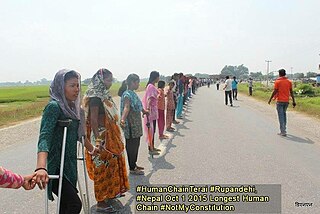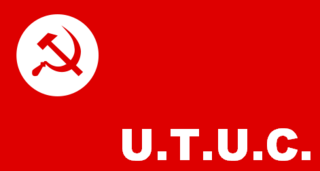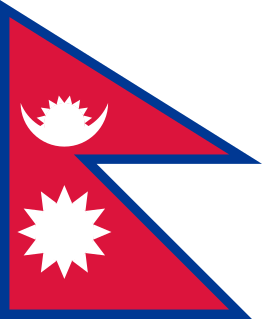
Kangchenjunga, also spelled Kanchenjunga, is the third highest mountain in the world. It lies between Nepal and Sikkim, India, with three of the five peaks directly on the border, and the remaining two in Nepal's Taplejung District. It rises with an elevation of 8,586 m (28,169 ft) in a section of the Himalayas called Kangchenjunga Himal delimited in the west by the Tamur River, in the north by the Lhonak Chu and Jongsang La, and in the east by the Teesta River.

The Communist Party of Thailand was a communist party in Thailand active from 1942 until the 1990s.

The Encyclopaedia of Islam (EI) is an encyclopaedia of the academic discipline of Islamic studies published by Brill. It is considered to be the standard reference work in the field of Islamic studies. The first edition was published in 1913–1938, the second in 1954–2005, and the third was begun in 2007.
Sylvain Lévi was an orientalist and indologist.

The Social Democratic Party was a social-democratic political party in Iceland. It was founded in 1916 as the political representation of the trade unions of Iceland.
Sir Edmund Ronald Leach was a British social anthropologist.

The term Madheshi people is defined in two different ways:

The Nepalese royal massacre occurred on 1 June 2001, at a house on the grounds of the Narayanhity Royal Palace, the residence of the Nepalese monarchy. Ten members of the family were killed in a mass shooting allegedly by Prince Dipendra during a party or monthly reunion dinner of the royal family in the house. The dead included King Birendra of Nepal and Queen Aishwarya.
Nepal is a country where industrial growth is limited, making land the most economic asset. However, obtaining land in Nepal is far from easy.

United Trade Union Congress is a central trade union organisation in India. UTUC is politically tied to Revolutionary Socialist Party. Abani Roy is the general secretary of UTUC. According to provisional statistics from the Ministry of Labour, UTUC had a membership of 383,946 in 2002.
Indian Federation of Labour is a federation of trade unions in India. IFL was founded in 1941 by M.N. Roy, after a split from the All India Trade Union Congress. IFL strongly supported the British war effort. Maniben Kara was a prominent IFL leader in the railways and V.B. Karnik was a prominent IFL leader amongst the dock workers.
Local elections to a municipal council for Kathmandu, the capital of Nepal, were first held on September 9, 1953. Candidates nominated by the illegal Communist Party of Nepal got 50% of the total votes cast. Out of a total of 19 seats, six were won by communists, four by Nepali Congress, four by Praja Parishad, one by Gorkha Parishad and four by independents.
Gorkha Parishad was a political party in Nepal, active in the 1950s. The party was led by Bharat Shamsher. The party was known as Gorkha Dal until 1952, when it was suppressed after having organised riots against B.P. Koirala. According to Levi, the party was a rightwing communal creation of the Ranas.

Elections were held to the Rastriya Panchayat in Nepal on 9 May 1981. 80% of the seats were elected through adult universal suffrage; this was the first election through universal suffrage held in Nepal in 22 years. However, political parties were banned at the time, and the main underground opposition forces called for a boycott of the election.
Rastriya Praja Party was a political party in Nepal, founded in 1952 when Matrika Prasad Koirala broke away from the Nepali Congress. As the leader of the party, M.P. Koiralawas appointed prime minister by the King. The party did however, not develop any major support base of its own. A splinter group of the party did later join the Praja Parishad of Tanka Prasad Acharya.
Nepali Congress (Subarna) is a political party in Nepal. The party was formed in 1978, through a split in the Nepali Congress. At the time of the split, the Nepali Congress (Subarna) was led by Bakhan Singh Gurung and Surya Prasad Upadhyaya. The party was initially known as the '38 group'.

The history of the city of Kathmandu, which is inseparable from that of the Kathmandu valley, dates back to ancient times.
Thangmi, also called Thāmī, Thangmi Kham, Thangmi Wakhe, and Thani, is a Sino-Tibetan language spoken in central-eastern Nepal and northeastern India by the Thami people. The Thami refer to their language as Thangmi Kham or Thangmi Wakhe while the rest of Nepal refers to it as Thāmī. The majority of these speakers, however, live in Nepal in their traditional homeland of Dolakhā District. In India, the Thami population is concentrated mostly in Darjeeling. The Thangmi language is written using the Devanagari script.
Michael James Hutt is Professor of Nepalese and Himalayan Studies at the School of Oriental and African Studies (SOAS), University of London. He is engaged in the study of modern and contemporary Nepali literature, and as a translator. He has also published on Nepali politics, Nepali art and architecture, censorship in the Nepali print media, and the Bhutanese refugee issue.









